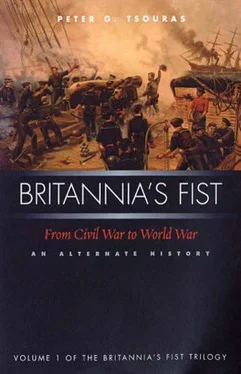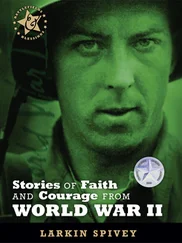Peter Tsouras - Britannia's Fist - From Civil War to World War
Здесь есть возможность читать онлайн «Peter Tsouras - Britannia's Fist - From Civil War to World War» весь текст электронной книги совершенно бесплатно (целиком полную версию без сокращений). В некоторых случаях можно слушать аудио, скачать через торрент в формате fb2 и присутствует краткое содержание. Год выпуска: 2008, ISBN: 2008, Издательство: Potomac Books Inc., Жанр: Альтернативная история, на английском языке. Описание произведения, (предисловие) а так же отзывы посетителей доступны на портале библиотеки ЛибКат.
- Название:Britannia's Fist: From Civil War to World War
- Автор:
- Издательство:Potomac Books Inc.
- Жанр:
- Год:2008
- ISBN:9781574888232
- Рейтинг книги:3 / 5. Голосов: 1
-
Избранное:Добавить в избранное
- Отзывы:
-
Ваша оценка:
- 60
- 1
- 2
- 3
- 4
- 5
Britannia's Fist: From Civil War to World War: краткое содержание, описание и аннотация
Предлагаем к чтению аннотацию, описание, краткое содержание или предисловие (зависит от того, что написал сам автор книги «Britannia's Fist: From Civil War to World War»). Если вы не нашли необходимую информацию о книге — напишите в комментариях, мы постараемся отыскать её.
Britannia's Fist: From Civil War to World War — читать онлайн бесплатно полную книгу (весь текст) целиком
Ниже представлен текст книги, разбитый по страницам. Система сохранения места последней прочитанной страницы, позволяет с удобством читать онлайн бесплатно книгу «Britannia's Fist: From Civil War to World War», без необходимости каждый раз заново искать на чём Вы остановились. Поставьте закладку, и сможете в любой момент перейти на страницу, на которой закончили чтение.
Интервал:
Закладка:
The world was already putting the praise of the Alabama to song in a dozen languages. As Semmes sailed into Cape Town Harbor, the locals were already singing in Afrikaans, “Daar kom die Alabama , die Alabama kom oor die see.” It would become a local legend that would endure for more than one hundred years.
2
WASHINGTON NAVY YARD, WASHINGTON, D.C.,10:20 AM, AUGUST 6, 1863
Gus Fox was not the sort of man to wait on events much less on other men. The assistant secretary of the Navy was a burly, powerful man, with a bushy mustache-goatee that bristled with power. He bent events to his will as the foundries did that shaped the great flat slabs of armor plate into the rounded turrets of his beloved Monitors. On this day he was waiting for one man as he paced the Navy Yard’s Anacostia River dock, and a naval lieutenant at that.
Whenever Fox appeared at the Yard, a primal energy was unleashed. Adm. John Dahlgren, during his time as superintendent of the Yard, had had the self-confidence and connections with Lincoln to withstand and guide Fox’s enthusiasm. But his successor, Capt. Andrew Harwood, was not as well connected and knew it. He would pay Fox the courtesies his dignity allowed and then get back to his own work and leave the Assistant Secretary to whatever had brought him to the Yard. Fox understood the game and played it well. Being the brother-in-law of the Postmaster General and the son-in-law of a major figure in the Republican Party had been the trick that landed him the job. That he was uniquely qualified for it was not something that American patronage politics encouraged, but this time it had hit a bull’s-eye.
Everyone knew that Gideon Welles was the Secretary of the Navy. Everyone also knew that Fox was the Navy. Secretary Welles stuck to policy and left the conduct of actual operations to Fox, who had the complete confidence of the officer corps. He was, after all, one of their own. A former naval officer, he resigned during the service doldrums of the 1850s, but the war had drawn him back like a magnet.
In late 1860, as the issue of war or peace had hung in the balance and the new President and his cabinet struggled with whether to relieve Fort Sumter, Fox had figured out the how and threw the plan into Lincoln’s lap. It was hardly his fault that the relief expedition he accompanied had arrived in Charleston Harbor just as the Confederates began the bombardment of the fort. Fox had the dubious honor of escorting the surrendered garrison home. That experience only fueled his aggressive and energetic nature. He had suggested and organized the first important naval success of the war by seizing Port Royal in South Carolina and turning it into the Navy’s forward operating base without which the blockade could not have been maintained so far south.
Lincoln had been overjoyed that the Navy had pulled such a beautiful rabbit out the hat when most news had reeked of bitter frustration and failure. If Dahlgren was close to Lincoln, now so was Fox. He had piled high his credit with the President with his enthusiastic support of John Ericcson’s famous Monitor and especially of the follow-on class, the Passaics . Those ships formed the fighting core of Dahlgren’s force off Charleston. Another larger class of shallow-draft monitors, the Casco class, was now abuilding along the Atlantic coast and along the Ohio.
Fox was not one to hoard his credit. He wagered it freely on new games as they came up. He was ruthless and arrogant, but admirals had more to fear from those features than lieutenants did. He was also an instinctive fighter, seized new ideas and opportunities, and could size up good men in a snap.
One such man was on the bridge of the Nansemond gliding up to the dock. Fox liked such men and gave them bigger and bolder commands. There were plenty of commands to go around in a navy that had mushroomed so quickly in size-and not nearly enough bold and lucky men to take them. The evidence of that lucky boldness was the prize trailing behind Lamson’s Nansemond . She was the British blockade-runner, the Margaret and Jesse . Lamson had caught her off Wilmington, where his luck had blossomed. He had come across her low in the water with a heavy cargo of lead-those deadly accurate Whitworth breach-loading rifled guns and enough ammunition to keep them firing for years. The weight of her cargo had been her undoing. Built as a British mail packet, the iron-hulled, side-wheeler Margaret and Jesse was the only ship afloat able to do sixteen knots, but slowed by the greed of her cargo, Nansemond had fallen on her like a hawk.
Lieutenant Lamson knew Fox by sight. Any aggressive officer among the blockading and river fighting squadrons along the Atlantic coast was sure to have met Fox. As the ship came alongside the dock, Fox took the time to examine the sleek ship coming up to dock outboard of Nansemond . Then his eyes moved to the bridge and locked on Lamson’s.
“Captain, come ashore immediately. I must speak with you,” Fox’s voice boomed. Lamson bounded down the gangplank as soon as it hit the dock. He took Fox’s extended hand and found the older man was trying to crush it as he grinned at him. Lamson smiled back and met grip with grip until Fox let go. “Good to see you again, young man. A fine prize.” He looked thoughtful for a moment and said, “You may not have seen the last of her.” He motioned to the carriage nearby. “We must hurry. You are wanted at the White House.
BALTIMORE AND OHIO RAILROAD STATION, WASHINGTON, D.C., 10:30 AM, AUGUST 6, 1863
The lieutenant saluted. “Colonel Sharpe?” he asked the officer who had just stepped off the train car. George H. Sharpe was on the short side of medium height, round shouldered, and with a walrus mustache, a plain, even homely looking thirty-five-year-old man and not a very martial figure by any means. He was a man you could easily miss-until he spoke, that is.
“Lieutenant, I am Colonel Sharpe.” The young man was taken aback at the transformation. Sharpe’s face had brightened with a disarming smile and his blue-gray eyes sparkled with good humor.
“I am to take you to the White House, sir, by direction of the Secretary of War.”
Sharpe reflected that life was getting more and more interesting as the carriage clattered down Pennsylvania Avenue. He had been summoned by the iron-willed Secretary to Washington with no explanation from his staff position at the headquarters of the Army of the Potomac at Brandy Station in Virginia, the furthest point of the Army’s advance after Gettysburg. He had met the formidable Edwin McMasters Stanton before. His duties had taken him to Washington repeatedly before Gettysburg, and he had briefed Stanton any number of times. He knew that the Secretary of War was a force of nature, single-minded will personified. Stanton had come to national prominence shortly before the war when he had defended Dan Sickles for shooting his wife’s lover dead right outside the White House and won the case by advancing the insanity defense for the first time in American legal history. Because of those briefings, Stanton had acquired a taste for what Sharpe had to say.
Sharpe, a slope-shouldered man from Kingston, New York, was unique in any number of ways. He was a Hudson Valley aristocrat, sophisticated and cosmopolitan. He was one of the best-educated men in the country, with degrees from Rutgers and Yale Law School. He had been the chargé at the Vienna legation and was something of a linguist, fluent in Latin and French. His mousy exterior gave no indication that he liked to have good time. A connoisseur of fine food and wine, he was not above staggering back from the Irish Brigade’s St. Patrick’s Day celebration tight as a tick. He also had a mind as sharp as an obsidian razor.
Читать дальшеИнтервал:
Закладка:
Похожие книги на «Britannia's Fist: From Civil War to World War»
Представляем Вашему вниманию похожие книги на «Britannia's Fist: From Civil War to World War» списком для выбора. Мы отобрали схожую по названию и смыслу литературу в надежде предоставить читателям больше вариантов отыскать новые, интересные, ещё непрочитанные произведения.
Обсуждение, отзывы о книге «Britannia's Fist: From Civil War to World War» и просто собственные мнения читателей. Оставьте ваши комментарии, напишите, что Вы думаете о произведении, его смысле или главных героях. Укажите что конкретно понравилось, а что нет, и почему Вы так считаете.












